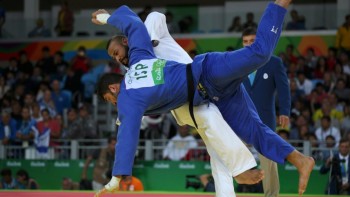
‘It’s another screw in an entire system, but it gave us a full picture of the matches and rivals,’ says men’s team coach Oren Smadja.
Behind the successes of Israel’s judo team at the Rio Olympics is an interesting venture that could be described as “startup nation meets training mat.” It was only in April that Aviv Hatzir, an entrepreneur and former judoka himself, started Boost to develop a virtual analyst for athletes.
The system was supposed to only be marketed later this year, but as part of the preparations for Rio and with a push from the Israel Judo Association and the Israel Olympic Committee, development was expedited for the benefit of the Israelis competing in Rio.
Boost is developing an analytics tool in the form of a chat-bot, which allows athletes and their trainers to ask questions about the athlete himself, his training or his rivals in an upcoming competition. The system, Hatzir explains, analyzes the question using artificial intelligence and gives the questioner an immediate response. In cases where an answer cannot be automatically provided because it requires more research, the question is referred to a human analyst, who gives an answer tailored to the question, which helps improve the system’s abilities in the future.
Boost joins a wave of startups that are exploiting the big-data revolution to develop analytic tools for all sorts of organizations. The sports world – particularly basketball and soccer teams – is a heavy user of tools to analyze various data. NBA teams, for example, are known to have teams of analysts who process all sorts of data gathered from devices and sensors on the court.
To start, Boost developed an engine that collected all the information that exists on the web about every rival judoka, starting from available technical information like physical characteristics, achievements and various statistics, and then analyzing all the matches the rival was in, based on thousands of videos that were coded automatically and manually. The next stage had the system process all the information using algorithms that were able to produce an exact profile of every rival athlete, with a stress on predicting future trends and identifying his strong points and potential weak points.
“It’s another screw in an entire system, but it gave us a full picture of the matches and rivals,” said Oren Smadja, the Israeli Olympic medalist in judo who now coaches the men’s national team. “When I competed in the Barcelona Olympics in 1992, we shlepped videotapes to study our rivals. Here it was all ready and it’s presented in an accessible fashion that allows us to ask questions at any time. You cannot cope with so much information without this tool, and we used it a lot. It helped us and proved itself, and we will continue to use it in the future.”
Hatzir explains that before Or Sasson’s match with Egyptian Islam al-Shahabi, which caused a media storm when the latter refused to shake Sasson’s hand, the professional staff believed that Shahabi would open the match with blows, rather than with classic judo moves. To better understand how to contend with this, the system was asked several questions; it identified the mistakes Shahabi tended to make in such combat and was able to give insights. Before the match with undefeated champion Teddy Riner of France, the system noted that when one grabs Riner in a certain way on his left lapel, it’s hard for him to fight at his best.
“It could be that this is information that coaches know, because he’s a known athlete, but we make the information and insights available for many other athletes,” said Hatzir. “We didn’t invent judo match analysis, but we streamlined and simplified the process.”
This article was originally published on www.haaretz.com and can be viewed in full
 (0)
(0) (0)
(0)Archive
- April 2024(123)
- March 2024(112)
- February 2024(109)
- January 2024(95)
- December 2023(56)
- November 2023(86)
- October 2023(97)
- September 2023(89)
- August 2023(101)
- July 2023(104)
- June 2023(113)
- May 2023(103)
- April 2023(93)
- March 2023(129)
- February 2023(77)
- January 2023(91)
- December 2022(90)
- November 2022(125)
- October 2022(117)
- September 2022(137)
- August 2022(119)
- July 2022(99)
- June 2022(128)
- May 2022(112)
- April 2022(108)
- March 2022(121)
- February 2022(93)
- January 2022(110)
- December 2021(92)
- November 2021(107)
- October 2021(101)
- September 2021(81)
- August 2021(74)
- July 2021(78)
- June 2021(92)
- May 2021(67)
- April 2021(79)
- March 2021(79)
- February 2021(58)
- January 2021(55)
- December 2020(56)
- November 2020(59)
- October 2020(78)
- September 2020(72)
- August 2020(64)
- July 2020(71)
- June 2020(74)
- May 2020(50)
- April 2020(71)
- March 2020(71)
- February 2020(58)
- January 2020(62)
- December 2019(57)
- November 2019(64)
- October 2019(25)
- September 2019(24)
- August 2019(14)
- July 2019(23)
- June 2019(54)
- May 2019(82)
- April 2019(76)
- March 2019(71)
- February 2019(67)
- January 2019(75)
- December 2018(44)
- November 2018(47)
- October 2018(74)
- September 2018(54)
- August 2018(61)
- July 2018(72)
- June 2018(62)
- May 2018(62)
- April 2018(73)
- March 2018(76)
- February 2018(8)
- January 2018(7)
- December 2017(6)
- November 2017(8)
- October 2017(3)
- September 2017(4)
- August 2017(4)
- July 2017(2)
- June 2017(5)
- May 2017(6)
- April 2017(11)
- March 2017(8)
- February 2017(16)
- January 2017(10)
- December 2016(12)
- November 2016(20)
- October 2016(7)
- September 2016(102)
- August 2016(168)
- July 2016(141)
- June 2016(149)
- May 2016(117)
- April 2016(59)
- March 2016(85)
- February 2016(153)
- December 2015(150)